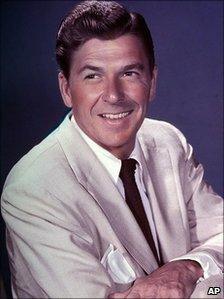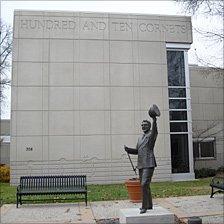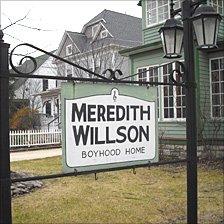Optimism and virtue: What the Midwest wants in a leader
- Published
You'd never know it from the intensity of the cable chatter on the 24-hour TV news channels, but we are about as far as it is possible to get from America's next election, which will be the showdown for the White House at the end of 2012.
The two-year gap between congressional mid-terms this November and the presidential elections, though, will be filled with fund-raising and campaigning - the US these days is locked in a perpetual election which is making the business of governance harder than ever.

The power of confidence: Ronald Reagan
It is hard to say quite how things got this way.
In part, it is because the vacuous modern news cycle is better at dealing in speculation (where you can't be wrong) than in analysis of what has already happened (which is hard and time-consuming and therefore expensive).
And there is a fund-raising issue too.
It may have cost as much as $1bn to get Barack Obama elected two years ago and any serious challengers for the White House next time around will already be filling their war chests. Anyone who has waited does not have a chance.
And finally there is our own tendency as an audience to prefer the gladiatorial atmosphere of the presidential race to the challenges of studying and evaluating governance.
Who wants to try and work out what quantitative easing might be when we can start speculating on whether Sarah the Barracuda can really beat No-Drama Obama?
Music Man
The road to the White House begins, of course, in Iowa, whose caucuses will mark the traditional start of the primary election season early in 2012.
Keen candidates are already finding reasons to visit the Midwestern state, where voters pride themselves on their flair for a polite but challenging brand of retail politics which really do test the challenger.
So, anxious to spare you months of agonising waiting for the inevitable speculation to begin, we thought we'd head for the winter cornfields of Iowa a whole year early to ask what Americans - and Midwesterners in particular - really want from a leader.

Music and a stubborn optimism are still central to life in Mason City
Our destination was Mason City, a small town on the road from Minneapolis to Des Moines which was immortalised by Meredith Wilson, in slightly fictionalised form, as River City in The Music Man.
Wilson was a kind of easygoing genius whose muse tended to stay firmly on the sunnier side of the street.
His seasonal composition It's Beginning to Look a Lot Like Christmas makes Rudolph the Red-Nosed Reindeer seem as dark as The Ride of the Valkyries.
The Music Man is his masterpiece - the story of a con man who comes to River City with a scam that involves selling imaginary musical instruments, collecting the payments and then skedaddling before any realises they have been tricked.
In River City though, the con man falls in love with the straight-laced local librarian, lingers, and is caught.
Instead of punishing him for the fraud, though, the townspeople, prompted by the librarian, realise that the music man's confidence and energy have transformed them and their dour town. They forgive him, and indeed acclaim him.
Optimism and energy
The show has plenty of great tunes (including 76 Trombones and 'Til There Was You), and it is a gently amusing satire of the life of the American small town in the innocent days just before World War I.
But it has always seemed to me that it was something more, too - a kind of slyly amusing portrait of what Americans look for in a leader.

Traditional Iowan virtues include neighbourliness, thrift and hard work
And since it is in Iowa that America begins its search for a new leader every four years, it seemed worth going to Mason City to look at the legacy of the show.
The essential quality, runs the argument, is a belief in the transformative powers of optimism, and energy and confidence.
And like just about all other Iowans, the people of Mason City are itching to meet the Republican hopefuls for the next election to find out how they measure up.
Like small towns across the US, Mason City has been hurting in the recession.
Jobs have been lost in the local cement industry and it has been tough to attract the investment to replace them.
Russ Kramer, a musician who heads the Mason City high school band programme, says that music, and a stubborn spirit of optimism which it helps to underpin, are still central to life in the town.
"I really believe in my kids," he told me. "I see a lot of leadership there and a lot of wanting to make sure that things go in the right direction in the future. And it's the arts which are going to help us to find new ways of doing things, of making money in the future."
Old-fashioned virtues
David Vikturek, who runs The Music Man heritage centre in Mason City, believes that the traditional Iowan virtues of neighbourliness, thrift and hard work will somehow help America prevail, even in a world where its economic problems are complex and deep-seated.
The Music Man was never meant, of course, as a primary season primer, but for what it is worth, it suggests that what Americans really want in their leaders is a kind of boundless belief that somehow this country will always rise above its problems.
Think Ronald Reagan and you will have a feeling for the required style.
The folks of modern real-life Mason City do appear to share that belief themselves - the American certainty that the old-fashioned virtues of the New World will somehow prevail in a crisis.
It will be a while before the primary-season politicking really starts to gather momentum in Iowa and in the relatively quiet months that lie ahead the candidates could do worse than pay a visit to Mason City.
As the Music Man found, the folks there may be tough to impress but if you can win them over there's no better preparation for the bigger battles to come.